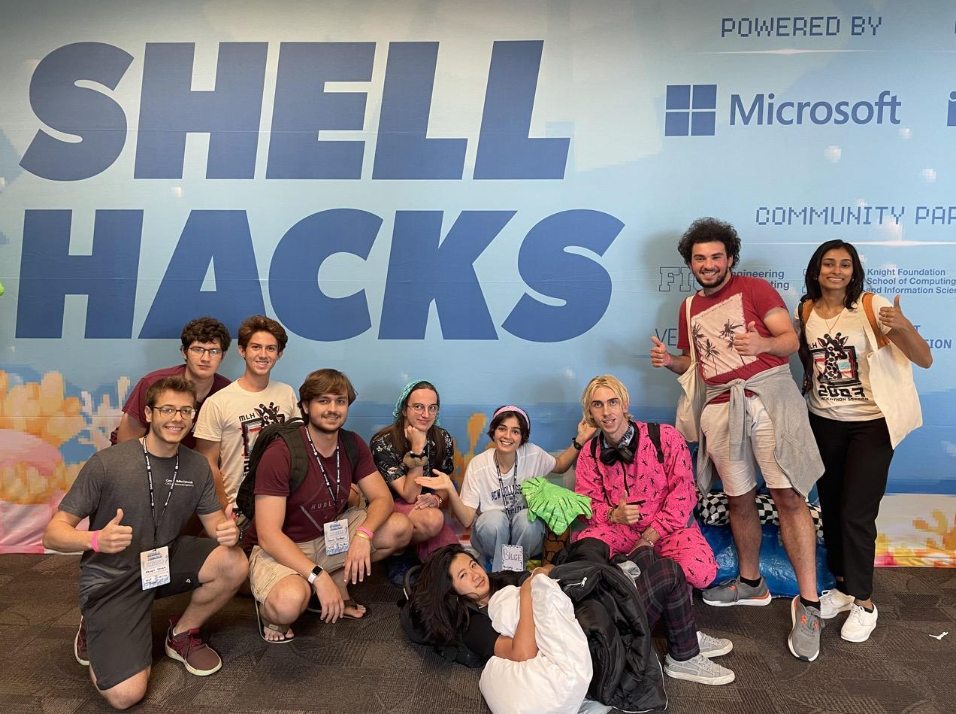Recently, 10 students from the New College Computer Science Program attended the Shellhacks hackathon at Florida International University (FIU). The event was brought to their attention by thesis student Ahmet “Sami” Cemek, who had emailed the Computer Science Program about the event.
Hackathons, also known as social coding events, are hustling hotspots for students who are hoping to pursue a career in tech. From providing networking opportunities with major company sponsors to offering workshops that educate on topics in the industry that aren’t covered in the traditional academic setting, hackathons serve as a beacon of opportunity.
Shellhacks is Florida’s largest hackathon, with a total attendance of more than 1,500 students this year alone. The hackathon was founded in 2017 by INIT FIU. The 36-hour event involves representatives from large companies such as Google, Microsoft and State Farm arriving and posing a project prompt that student teams of no more than four people compete over for prizes.
The very nature of this event requires meticulous planning, with careful oversight regarding what is communicated to the students involved. New College students who attended reported issues with aspects of the event’s organization. .
Problems encountered
The Shellhacks website mentioned that all students would be provided with three meals a day and a place to sleep. However, students’ expectations were not exactly met.
Thesis student and Catalyst reporter Saloni Labh, second-year Safari Swanson and third-year Andy Trinh arrived at the FIU location at 9 pm, having driven more than five hours to reach the destination. A few hours earlier, they had pulled off the highway to fill an almost empty gas tank, driving through a beautiful Native American Reservation for a solid 45 minutes before any of them realized they were driving in the wrong direction.

When the trio finally reached the registration spot, they were told there was not enough space for them to sleep indoors, despite the fact that all three of them had pre-registered. This was due to Shellhacks admitting students beyond the facility’s capacity. The planners predicted a drop-rate from the first day to the second day from previous events, and, based on the drop rate, overbooked the event, per event employees. There were severe implications for students’ safety and well-being. The trio were only three of many who were initially denied entry and advised to find a place to sleep in the dead of the night. Police officers were present to prevent students from sleeping on the driveways of the venue.
The university did not offer vegan or vegetarian food options the first night, and half of the New College students at the Hackathon could not eat dinner due to personal dietary restrictions.
Finally, there were not enough work tables for every student. Many students had to code on the floor.
Swanson equated the nature of the hackathon and its planning failures as a “computer science version of Fyre Fest during a late-night group get-together.
“It’s a [redacted] pyramid scheme of a hackathon,” agreed second-year Demetre Seturidze.
Overall, volunteers and workers were overloaded – there were too many students and not enough volunteers in attendance. The fluorescent lights in the FIU building were on constantly, and sleeping in the loud and packed venue proved to be a challenge.
Additionally, students were expected to pay six dollars to use the showers. “I am fine with paying the $70 in gas that it took to get here, but six dollars for a shower is where I draw the line,” retorted one student, who preferred not to be identified by name.
A few of the New College students had friends in Miami, and showered at their houses. Four of the 10 members admitted to not showering for three days.
Finally, both the opening and closing ceremonies were heavily delayed due to technical issues, and the late closing ceremony compelled students to alter their plans for departure.
Positive Takeaways
All things considered, a few wonderful app ideas that many of the squad members are considering pursuing were spawned during ShellHacks. Seturidze, Swanson, Trinh and this Catalyst reporter began working on a language-learning app called LangGPT.
Several of the attendees also said they are having an easier time in their Computer Science classes because of the intensive coding sessions the three sleepless days at Shellhacks demanded from them.

